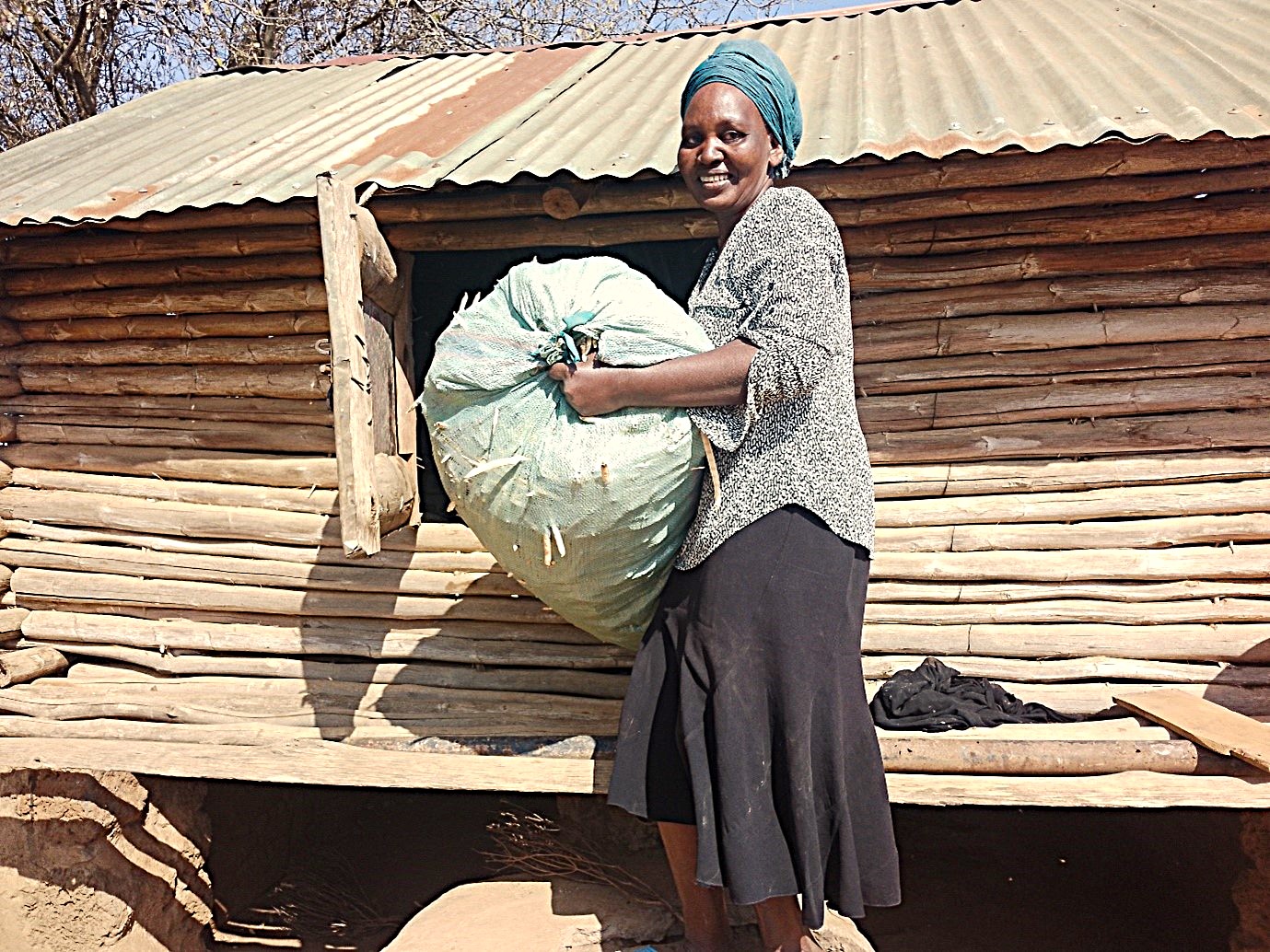

Anna happily storing her harvested sorghum, maize, green grams and cowpeas in her granary
In the heart of Boma-4 Village in Kiu Sub-location- Makindu Ward, Makueni County, lives Anna Mutunga, a farmer whose story mirrors the transformation that Climate-Smart Agriculture (CSA) brings to semi-arid communities.
For years, Anna depended on planting hybrid maize, an expensive crop that demanded costly inputs and yielded little in the face of prolonged drought and erratic rainfall. The hard work rarely paid off, and feeding her family became a constant struggle. Everything began to change when Anna joined Smart Farmers Village Savings and Lending Association (VSLA) group supported by Fadhili Trust. Through CSA training, she learned how to make farming more productive, sustainable, and less dependent on the unpredictable weather.
“My granary was once filled with old, broken household items. Today, it stores my farm harvest including greengrams, maize, cowpeas and sorghum, enough proof that change is possible,” she says with pride, showing her neatly stored grains, crops she learned to grow and preserve through CSA practices.
Thriving with a Kitchen Garden
To reduce the cost of buying vegetables, Anna established a 5m × 2m size kitchen garden, producing around Four kilograms of vegetables weekly. Using recycled gray water, organic compost, and mulching, she now grows a variety of organic vegetables even during the dry season.
Prior to establishing a kitchen garden, Anna would spend approximately Kshs.100 per day on average on vegetables for a family of 5-members, making it Kshs.700 per week. She now saves the Kshs.700 that she would have used to buy vegetables and diverts it to her VSLA group, helping her build resilience and financial security. With the success of her garden, she plans to expand production and sell vegetables to neighbors, turning her backyard into a small agribusiness.
Chicken Rearing for Food and Income
Anna also ventured into chicken rearing, keeping 25 layers and 2 cocks. Her flock produces an average of 13 eggs a day, earning her about Ksh 2,700 monthly from sales, while still keeping enough for family consumption.
She practices organic poultry management, using herbal remedies like neem and pawpaw leaves instead of antibiotics and formulates local feeds from sorghum and greens. The chicken manure enriches her kitchen garden, closing the loop in a sustainable farming system.
Building Resilience through Climate-Smart Practices
Anna’s homestead today stands as a model of climate resilience and innovation. Around her compound, nothing goes to waste. She carefully composts kitchen scraps and chicken manure to enrich her soil, turning everyday waste into valuable fertilizer. A 1,000-litre tank collects rainwater from her rooftop, ensuring she has water to irrigate her garden even during dry spells. She has also embraced agroforestry, planting ten Moringa trees and other fodder trees that improve soil health and provide shade for her livestock. In her garden, Anna alternates leafy vegetables with legumes to conserve moisture and restore soil fertility. Though she still faces challenges such as limited water during the dry months and occasional poultry diseases, Anna remains hopeful and determined — a living example of how resilience can flourish even in harsh conditions.
A Brighter Tomorrow
Through support from Fadhili Trust with support from TearFund Canada and Canadian Food Grain Bank (CFGB), Anna has transformed her small farm into a hub of innovation and learning. Her journey from dependency to self-reliance demonstrates how climate-smart farming and community savings can empower rural families to thrive even in challenging environments.
“I now grow my food, sell the surplus, and save every month, my life has changed for the better,” says Anna with a beaming smile.